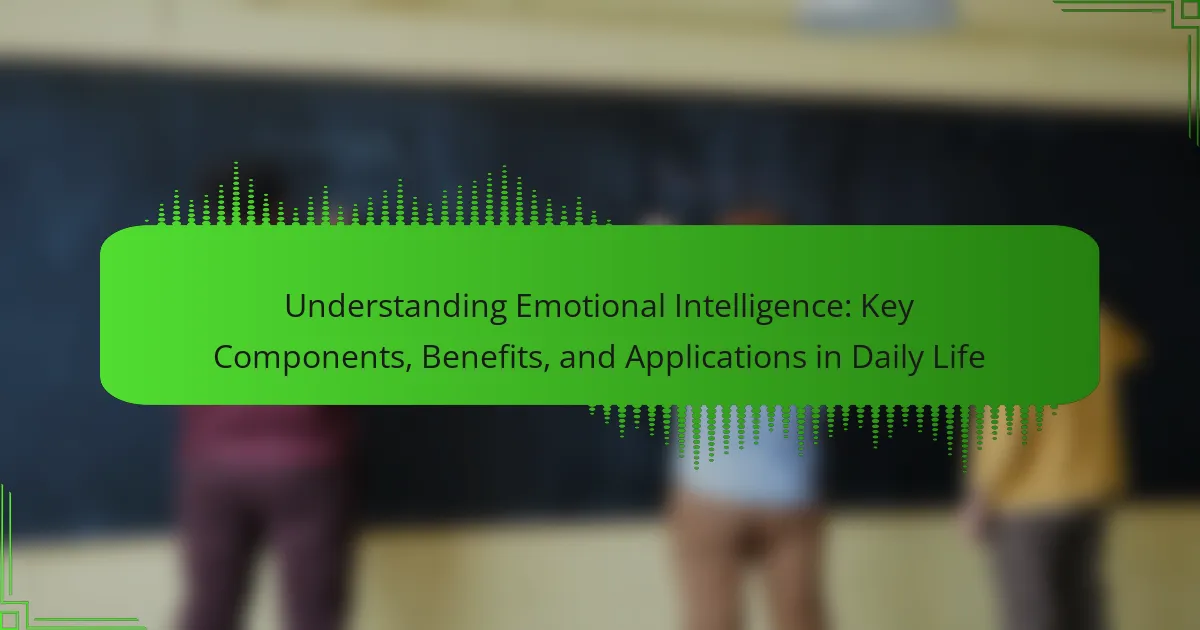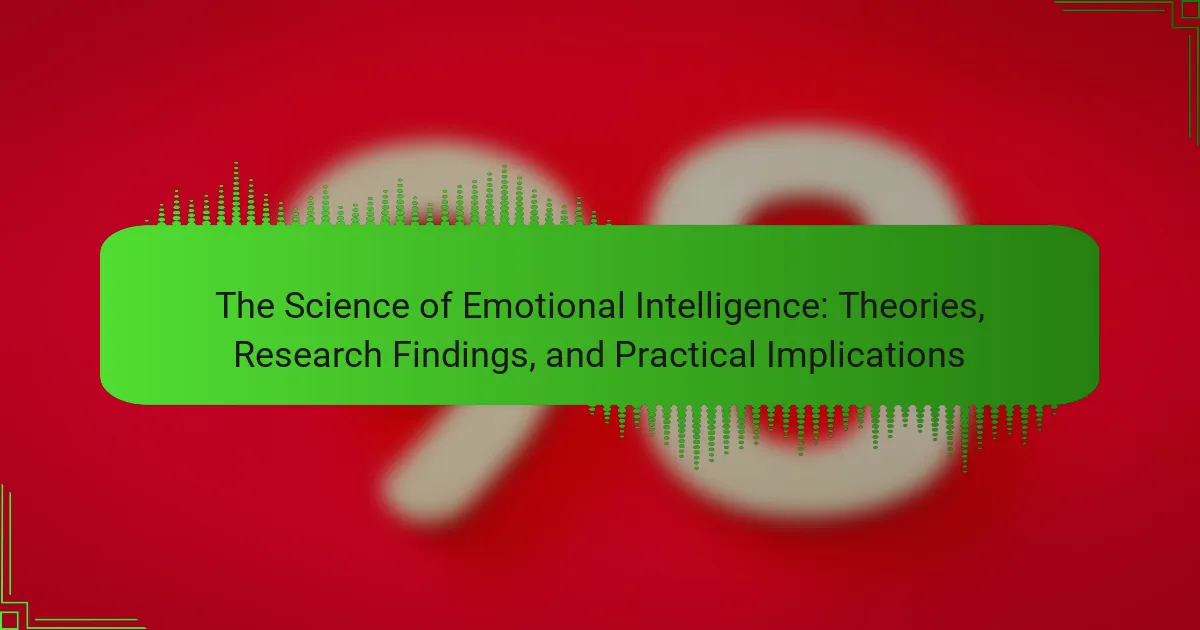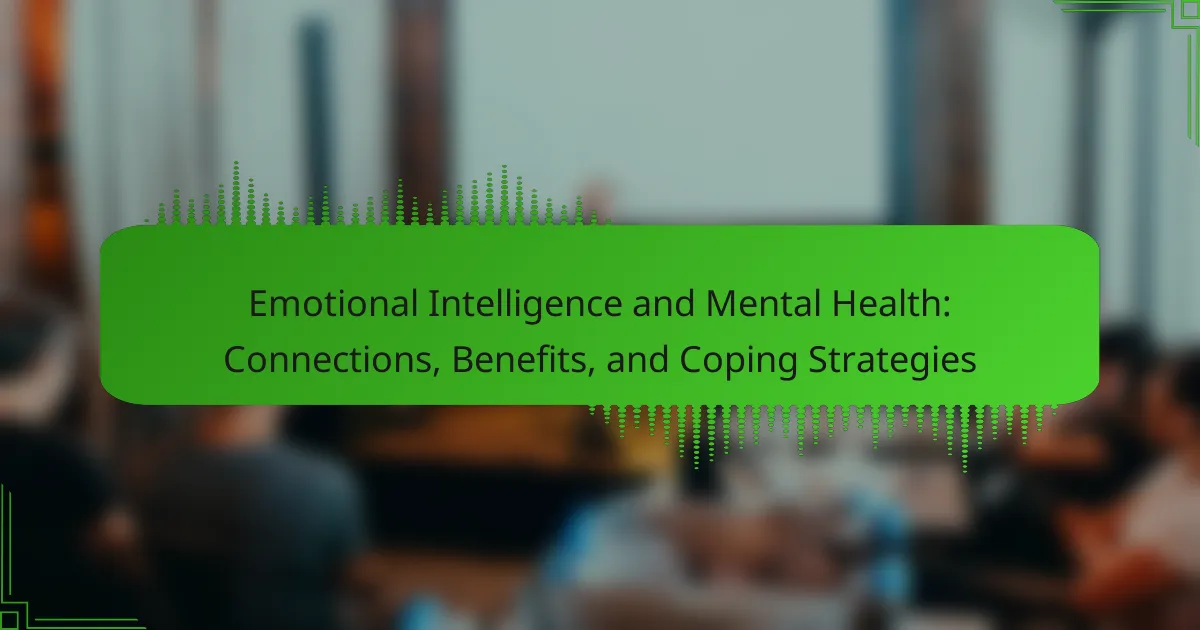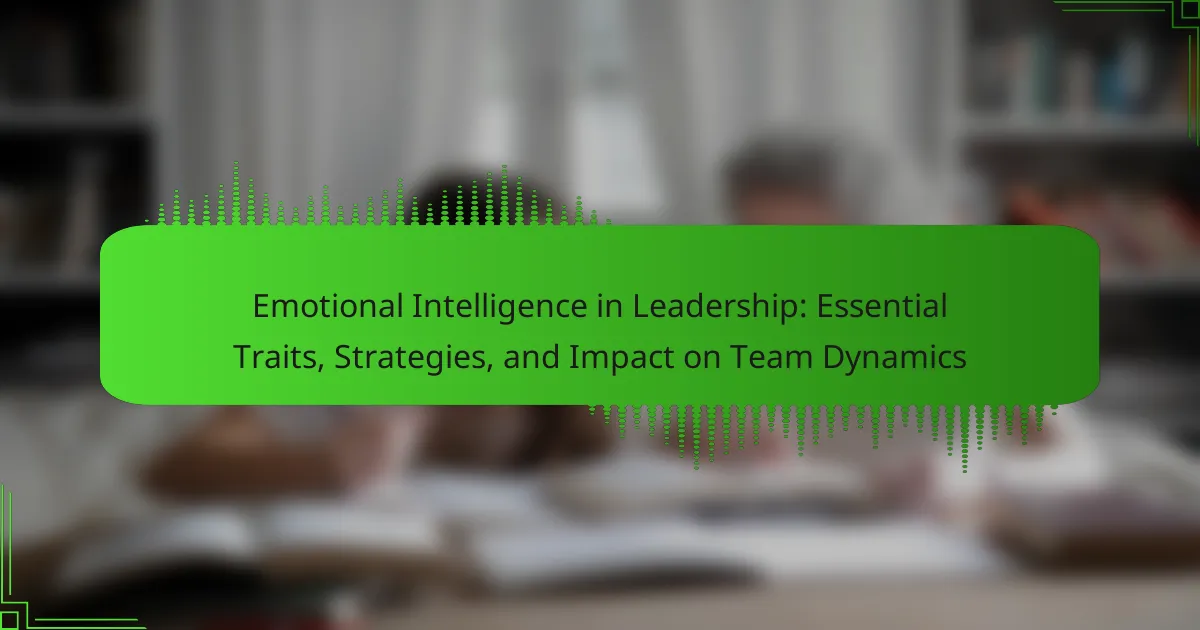Emotional intelligence is the capacity to recognize, understand, and manage emotions in oneself and others, encompassing skills such as emotional awareness, empathy, and interpersonal communication. This article explores the key components of emotional intelligence, highlighting its benefits in personal and professional contexts, including improved relationships, better stress management, and enhanced workplace performance. It emphasizes the importance of self-awareness, self-regulation, social skills, and motivation as essential elements for developing emotional intelligence. Additionally, research findings underscore the correlation between high emotional intelligence and positive mental health outcomes, effective leadership, and overall job satisfaction.
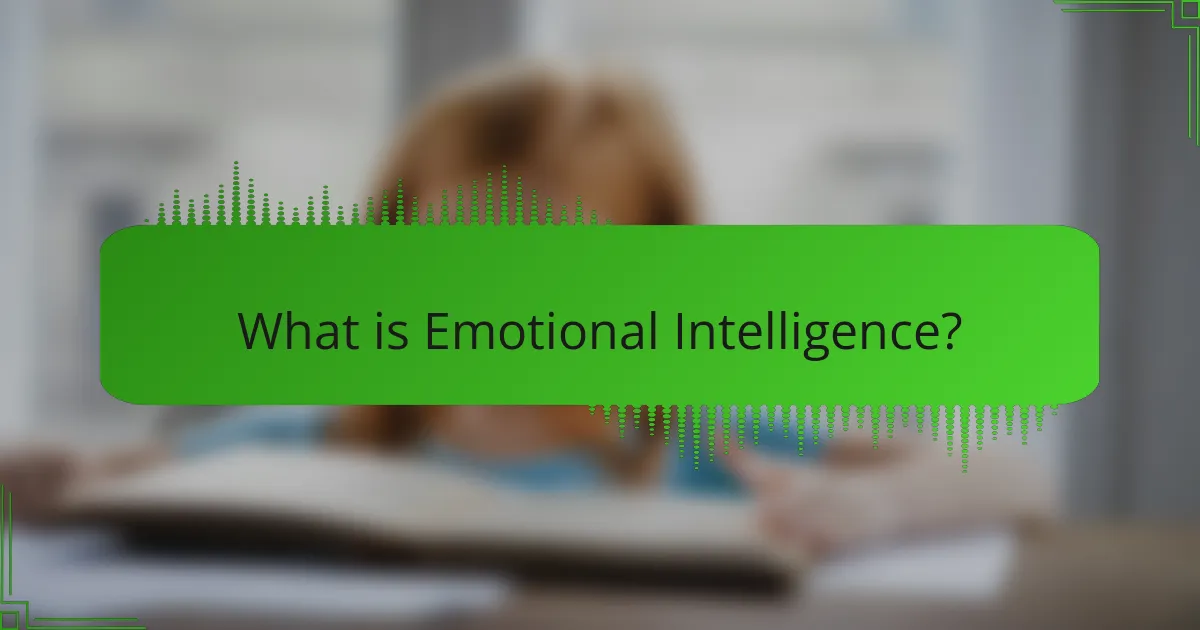
What is Emotional Intelligence?
Emotional intelligence is the ability to recognize, understand, and manage emotions in oneself and others. It encompasses skills such as emotional awareness, empathy, and interpersonal communication. Research indicates that individuals with high emotional intelligence can better handle stress and make informed decisions. Studies show that emotional intelligence contributes to improved relationships and workplace performance. According to the World Economic Forum, emotional intelligence is among the top skills needed for success in the modern workforce.
How is Emotional Intelligence defined?
Emotional Intelligence (EI) is defined as the ability to recognize, understand, and manage one’s own emotions and the emotions of others. It encompasses skills such as emotional awareness, empathy, and emotional regulation. Research by Daniel Goleman identifies five key components of EI: self-awareness, self-regulation, motivation, empathy, and social skills. These components enable individuals to navigate social complexities and make informed decisions. Studies show that high emotional intelligence contributes to better interpersonal relationships and professional success. For instance, a study published in the Journal of Applied Psychology found that EI is a strong predictor of job performance in various fields.
What are the key components of Emotional Intelligence?
The key components of Emotional Intelligence are self-awareness, self-regulation, motivation, empathy, and social skills. Self-awareness involves recognizing one’s own emotions and their effects. Self-regulation refers to managing one’s emotions in healthy ways. Motivation includes harnessing emotions to pursue goals. Empathy is the ability to understand the emotions of others. Social skills encompass managing relationships to move people in desired directions. Research by Daniel Goleman identifies these components as critical for effective emotional functioning.
How does Emotional Intelligence differ from traditional intelligence?
Emotional Intelligence (EI) differs from traditional intelligence (IQ) in that EI focuses on the ability to recognize, understand, and manage emotions in oneself and others. Traditional intelligence primarily measures cognitive abilities, such as reasoning, problem-solving, and analytical skills. EI involves skills like empathy, self-regulation, and social awareness. Research by Daniel Goleman highlights that EI can predict success in personal and professional relationships better than IQ alone. Studies show that individuals with high EI are often more effective leaders and communicators. Traditional intelligence does not encompass these emotional and social competencies.
Why is Emotional Intelligence important?
Emotional intelligence is important because it enhances interpersonal relationships and decision-making. Individuals with high emotional intelligence can recognize and manage their own emotions effectively. This ability allows them to empathize with others, fostering stronger connections. Research shows that emotional intelligence contributes to better teamwork and collaboration in professional settings. A study by the Consortium for Research on Emotional Intelligence in Organizations indicates that emotional intelligence is linked to improved job performance. Additionally, emotionally intelligent people tend to handle stress better, leading to greater overall well-being. These factors demonstrate the significant role emotional intelligence plays in personal and professional success.
How does Emotional Intelligence impact personal relationships?
Emotional intelligence significantly impacts personal relationships by enhancing communication and empathy. Individuals with high emotional intelligence can better understand their own emotions and those of others. This understanding fosters deeper connections and reduces conflicts. Research shows that effective emotional regulation leads to healthier interactions. A study by Brackett et al. (2011) found that emotional intelligence correlates with relationship satisfaction. Furthermore, emotionally intelligent individuals are more adept at resolving disagreements. They can express their feelings constructively, promoting a positive relationship environment. Overall, emotional intelligence is crucial for nurturing and sustaining personal relationships.
What role does Emotional Intelligence play in professional success?
Emotional Intelligence (EI) significantly enhances professional success. EI enables individuals to understand and manage their emotions effectively. This skill fosters better communication and collaboration in the workplace. High EI is linked to improved leadership abilities. Research shows that leaders with high EI can inspire and motivate their teams more effectively. A study by TalentSmart found that 90% of top performers possess high emotional intelligence. Additionally, EI contributes to conflict resolution and better decision-making. Professionals with strong EI are more adaptable to change and stress. Thus, emotional intelligence plays a critical role in achieving career advancement and job satisfaction.
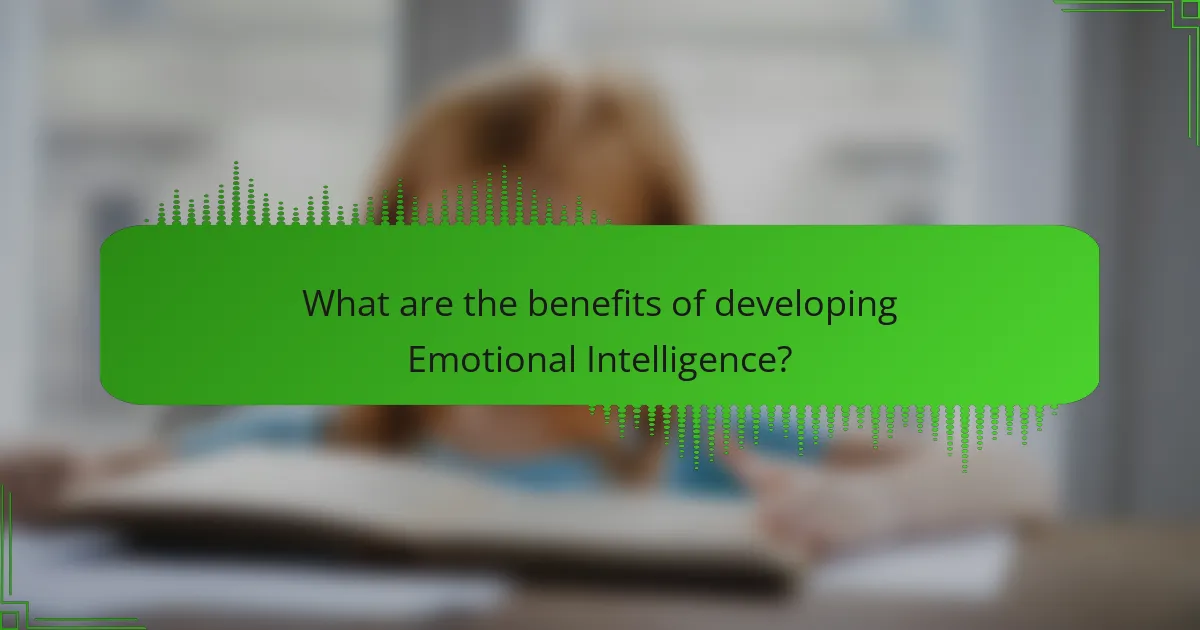
What are the benefits of developing Emotional Intelligence?
Developing emotional intelligence enhances interpersonal relationships and improves communication skills. It allows individuals to better understand their own emotions and those of others. This understanding leads to increased empathy and stronger connections. Research shows that high emotional intelligence correlates with better leadership abilities. A study by the Consortium for Research on Emotional Intelligence in Organizations found that emotionally intelligent leaders are more effective. Additionally, emotional intelligence contributes to better conflict resolution and stress management. Individuals with high emotional intelligence often report greater job satisfaction and overall well-being.
How can Emotional Intelligence enhance communication skills?
Emotional Intelligence enhances communication skills by improving self-awareness and empathy. Self-awareness allows individuals to recognize their emotions and how they affect interactions. This recognition leads to clearer expression of thoughts and feelings. Empathy enables understanding others’ emotions, fostering better responses. Effective communication relies on both speaking and listening. Individuals with high Emotional Intelligence can navigate conversations more adeptly. They can adjust their communication style based on emotional cues. Research shows that teams with emotionally intelligent members experience better collaboration. This results in more productive and harmonious interactions.
What techniques improve communication through Emotional Intelligence?
Active listening enhances communication through Emotional Intelligence. It involves fully concentrating on the speaker, understanding their message, and responding thoughtfully. This technique fosters empathy and builds trust. Nonverbal communication is also crucial. Body language, eye contact, and [censured] expressions convey emotions effectively. These cues can reinforce or contradict verbal messages. Emotional regulation is another key technique. Managing one’s emotions helps maintain composure during conversations. This creates a safe space for open dialogue. Providing constructive feedback is essential as well. It encourages growth and understanding without causing defensiveness. Lastly, practicing self-awareness aids in recognizing one’s emotional triggers. This insight allows for better interaction with others. These techniques collectively improve communication by fostering deeper connections and understanding.
How does Emotional Intelligence foster empathy in interactions?
Emotional Intelligence (EI) fosters empathy in interactions by enhancing self-awareness and social awareness. EI allows individuals to recognize their own emotions and the emotions of others. This recognition is crucial for understanding different perspectives. Empathy is the ability to connect emotionally with others. High EI individuals can better interpret non-verbal cues and emotional signals. Research shows that EI is linked to improved communication skills. A study by Mayer, Salovey, and Caruso (2008) found that higher EI correlates with greater empathy. This connection leads to more compassionate and supportive interactions. Consequently, EI promotes deeper relationships and effective conflict resolution.
What are the long-term benefits of Emotional Intelligence?
Emotional intelligence (EI) leads to several long-term benefits. It enhances interpersonal relationships by fostering empathy and understanding. Individuals with high EI are better at managing stress and conflict. This capability contributes to improved mental health over time. Research indicates that EI correlates with better job performance. A study by the Consortium for Research on Emotional Intelligence in Organizations found that EI is a key factor in leadership effectiveness. Furthermore, high EI promotes resilience, enabling individuals to adapt to change. Long-term EI development can lead to increased life satisfaction and well-being.
How does Emotional Intelligence contribute to mental well-being?
Emotional Intelligence (EI) significantly contributes to mental well-being by enhancing self-awareness and emotional regulation. Individuals with high EI can identify and understand their emotions. This awareness helps in managing stress and anxiety effectively. Furthermore, EI fosters empathy, allowing individuals to connect better with others. Improved interpersonal relationships lead to increased social support, which is crucial for mental health. Studies indicate that individuals with higher EI experience lower levels of depression and anxiety. Research from the Journal of Happiness Studies shows a positive correlation between EI and overall life satisfaction. Thus, EI plays a vital role in promoting mental well-being through emotional management and social connectivity.
What evidence supports the benefits of Emotional Intelligence in various settings?
Emotional Intelligence (EI) enhances personal and professional relationships. Research shows that individuals with high EI perform better in teamwork and leadership roles. A study by Salovey and Mayer (1990) established EI as a critical factor in effective communication and conflict resolution. In workplace settings, a meta-analysis by Joseph and Newman (2010) found a strong correlation between EI and job performance, particularly in roles requiring interpersonal skills. Additionally, a report from TalentSmart indicates that EI accounts for 58% of job performance across various industries. In educational environments, high EI contributes to better academic performance and social interactions, as evidenced by a study in the Journal of Educational Psychology (2016) which linked EI with improved student outcomes. These findings collectively support the assertion that EI provides significant benefits across diverse settings.
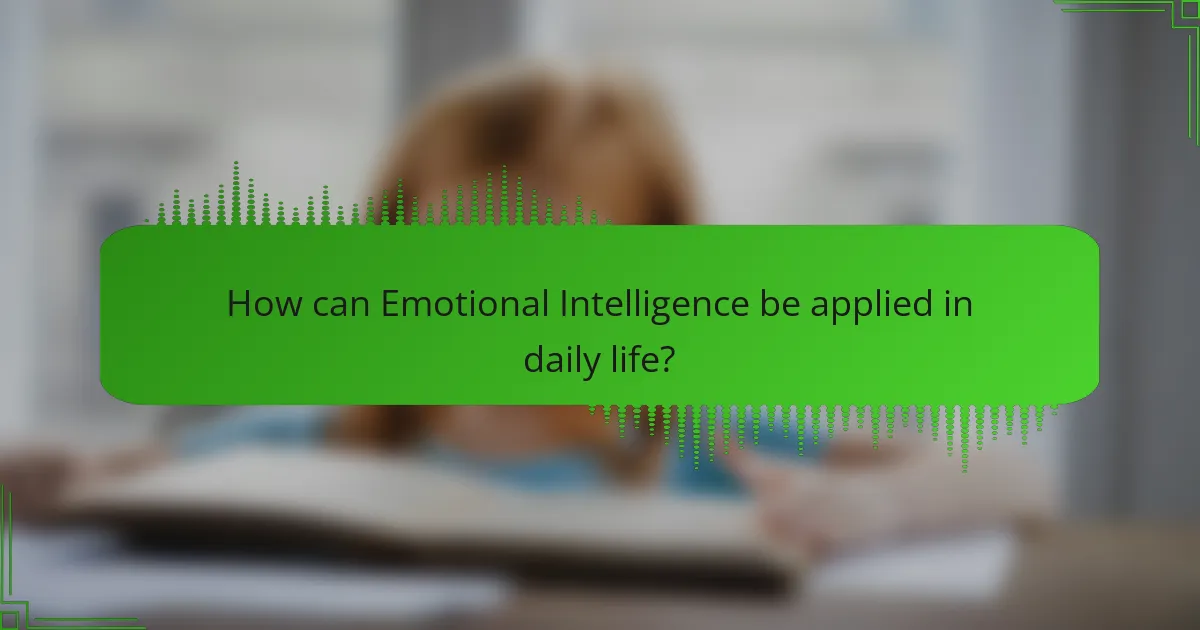
How can Emotional Intelligence be applied in daily life?
Emotional Intelligence can be applied in daily life through self-awareness, self-regulation, social skills, empathy, and motivation. Self-awareness allows individuals to recognize their emotions and understand their impact on behavior. This awareness helps in making informed decisions and improving interpersonal relationships. Self-regulation enables individuals to manage their emotions, leading to better stress management and conflict resolution. Social skills facilitate effective communication and collaboration with others. Empathy allows individuals to understand and respond to the emotions of others, fostering stronger connections. Motivation drives individuals to pursue goals with persistence and resilience. Research indicates that high emotional intelligence correlates with better mental health and workplace performance.
What practical strategies can enhance Emotional Intelligence?
Practicing mindfulness can enhance Emotional Intelligence. Mindfulness helps individuals become more aware of their thoughts and feelings. This awareness allows for better emotional regulation. Journaling emotions can also improve emotional understanding. Writing about feelings provides clarity and insight into emotional responses. Active listening is another effective strategy. It fosters empathy and strengthens interpersonal relationships. Seeking feedback from others enhances self-awareness. Constructive criticism helps identify areas for emotional growth. Engaging in role-playing scenarios can build empathy. This practice allows individuals to experience different perspectives. Regular self-reflection promotes continuous improvement in emotional skills. These strategies collectively contribute to a higher Emotional Intelligence quotient.
How can mindfulness improve Emotional Intelligence?
Mindfulness can enhance Emotional Intelligence by increasing self-awareness and self-regulation. Practicing mindfulness helps individuals recognize their emotions in real-time. This recognition allows for better emotional management. Improved emotional management leads to enhanced interpersonal relationships. Mindfulness also fosters empathy by encouraging perspective-taking. Research indicates that mindfulness training can lead to significant improvements in emotional skills. A study by Keng, Smoski, and Robins (2011) found that mindfulness practices correlate with higher Emotional Intelligence scores. This evidence supports the idea that mindfulness is a valuable tool for developing emotional competencies.
What role does self-reflection play in developing Emotional Intelligence?
Self-reflection is crucial for developing Emotional Intelligence. It allows individuals to assess their emotions and reactions. Through self-reflection, one can identify emotional triggers and patterns. This awareness leads to better emotional regulation. Research shows that individuals who engage in self-reflection exhibit higher emotional awareness. A study by Goleman (1995) emphasizes that self-awareness is a core component of Emotional Intelligence. Self-reflection enhances empathy, as it encourages understanding of others’ feelings. Overall, self-reflection fosters personal growth and improves interpersonal relationships.
How can Emotional Intelligence be integrated into professional environments?
Emotional Intelligence can be integrated into professional environments through training programs and workshops. These programs enhance self-awareness and interpersonal skills. Regular feedback sessions can help employees understand their emotional responses. Incorporating role-playing scenarios can simulate real-life situations. Encouraging open communication fosters a supportive culture. Leadership can model emotionally intelligent behavior to set an example. Research shows that companies with high emotional intelligence improve employee satisfaction and productivity. For instance, a study by TalentSmart found that 90% of top performers possess high emotional intelligence.
What are effective ways to promote Emotional Intelligence in teams?
Effective ways to promote Emotional Intelligence in teams include training programs, regular feedback, and team-building activities. Training programs enhance awareness of emotional cues and improve interpersonal skills. Regular feedback fosters open communication and encourages self-reflection among team members. Team-building activities create a safe space for sharing emotions and experiences. Research shows that teams with high emotional intelligence perform better and demonstrate increased collaboration. A study by Brackett et al. (2019) indicates that emotional intelligence training can lead to improved team performance and satisfaction.
How can leaders leverage Emotional Intelligence for better management?
Leaders can leverage Emotional Intelligence (EI) for better management by enhancing their self-awareness and empathy. Self-awareness allows leaders to recognize their emotions and understand their impact on others. Empathy enables leaders to connect with team members on a personal level. This connection fosters trust and open communication.
Effective leaders use EI to manage conflicts constructively. They assess emotional dynamics during disputes and facilitate resolutions. Additionally, leaders with high EI motivate their teams by recognizing individual strengths and providing constructive feedback. This approach increases employee engagement and satisfaction.
Research indicates that organizations with emotionally intelligent leaders experience improved team performance and lower turnover rates. A study by Goleman, Boyatzis, and McKee found that EI competencies significantly contribute to leadership effectiveness. Therefore, by developing EI, leaders can create a positive work environment that enhances overall productivity.
What tips can help individuals cultivate their Emotional Intelligence?
To cultivate Emotional Intelligence, individuals should practice self-awareness. This involves recognizing their own emotions and understanding how these emotions affect their thoughts and behaviors. Mindfulness techniques can enhance self-awareness by promoting present-moment focus.
Next, individuals should develop empathy. This means actively listening to others and trying to understand their feelings and perspectives. Engaging in conversations and asking open-ended questions can improve empathetic skills.
Additionally, managing emotions is crucial. Individuals should learn to regulate their emotional responses in various situations. Techniques such as deep breathing or taking a pause before reacting can be effective.
Furthermore, building social skills is essential. Effective communication and conflict resolution are key components of social skills. Participating in group activities can provide opportunities to practice these skills.
Lastly, seeking feedback from others can provide insights into one’s emotional behaviors. Constructive criticism helps individuals identify areas for improvement in their Emotional Intelligence.
Emotional intelligence (EI) is the ability to recognize, understand, and manage emotions in oneself and others, encompassing key components such as self-awareness, self-regulation, motivation, empathy, and social skills. This article explores the significance of EI in enhancing interpersonal relationships, decision-making, and professional success, highlighting its differences from traditional intelligence (IQ). It also discusses practical strategies for developing EI, its long-term benefits for mental well-being, and effective ways to integrate EI within professional environments. Ultimately, the article emphasizes the importance of cultivating emotional intelligence for improved communication, leadership, and overall life satisfaction.
